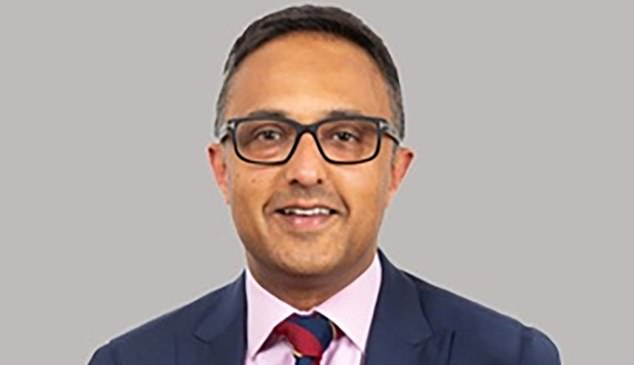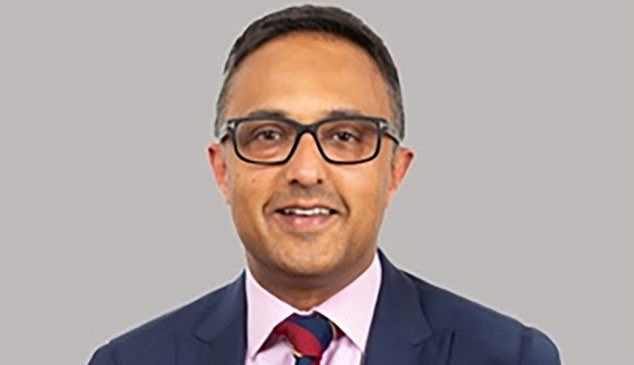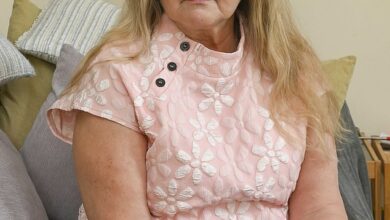The two essential DIY tests you need to do to protect yourself from fatal heart attacks, a leading cardiologist reveals — plus the five other surprising steps to help keep you safe



Heart disease claims twice as many lives as breast cancer each year in the UK, resulting in over 173,000 deaths – almost the same as the entire population of the city of Oxford.
What do you do to protect yourself against it?
The answer is probably “not much,” as dementia and cancer typically top the list of diseases that people most fear and actively try to avoid.
But heart disease affects more people than cancer and dementia combined, with around 2.3 million people in the UK suffering from coronary heart disease, the most common form. This is when arteries become blocked with a build-up of fatty deposits – or plaque. This plaque can break off and block blood flow to the heart, leading to a heart attack.
Heart disease can be a problem for people of all ages – any amount of plaque is a risk. It’s not just older patients who can suffer life-threatening heart attacks, about 26,000 people under the age of 75 die from heart attacks each year.

I am now 55 and I want to make the most of my time with my family, writes DR SUNDIP PATEL
When I saw my uncle, who was a cardiologist, helping a man in his 50s who had suddenly suffered a heart attack, I was inspired to specialize in cardiology.
But I also have a personal interest in it, as I have a strong family history of heart disease and my father, a retired general practitioner, has narrowed arteries.
I am now 55 and I want to make the most of my time with my family. I am a father of four children and my wife, Sue-Anne, is a cardiac nurse. Thanks to her encouragement, I do everything I can to keep my heart in good condition.
That’s how I do it.
Getting out of breath and sweating
I work long hours – three days a week I work 12 or 13 hours a day – but even if that means setting my alarm earlier than normal and getting up at 5am, I make time to exercise.
It helps to improve the condition of the heart so that it pumps more efficiently. This means that less pressure is put on the blood vessel walls and the blood vessel walls relax or soften.
It also makes me feel less stressed, which is also good for the heart as it lowers levels of hormones like cortisol and adrenaline, which can contribute to high blood pressure.
So I try to exercise five days a week for at least 30 minutes, which makes me out of breath and sweat. That’s the secret: that it makes you out of breath and sweat.
I take my two chow chows (Luna and Lolly) for a brisk walk every day and two or three times a week I do about 20 minutes on a rowing machine at the gym.
Skipping breakfast
I firmly believe in the benefits of intermittent fasting, where you only eat within a certain time.
It helps control appetite and blood sugar levels (eating throughout the day leads to repeated spikes in blood sugar levels, and if they are too high, they can damage your blood vessels).
I learned about it through the work of Dr. Michael Mosley and my wife encouraged me to try it too.
Since I started incorporating it into my life about 12 years ago, I feel more refreshed during the day. If I had a full lunch (I only eat fruit now), I would often feel sleepy in the afternoon.
Now a typical daily intake for me is a cup of coffee before exercise and maybe a glass of milk mid-morning, but other than that I don’t eat anything until 2pm, when I have fruit and berries for lunch. Then I have a meal in the evening (like chicken or fish and vegetables). I try to eat it at 8:30 or 9pm, but it depends on work.
In addition to fruits and vegetables with every meal, we eat oily fish at least once, if not twice, per week, mainly because the omega-3 fats they contain are good for heart health. For example, they slow the build-up of plaque on your teeth and help keep the walls of your blood vessels in better shape in general.
This way of eating has helped me lose weight. I started gaining weight with the birth of each of our children (the eldest is now 21) and this peaked 16 years ago when my youngest daughter was born. I weighed 90kg (14st 1lb) at the time – I am 5ft 10in tall – which gave me a BMI of almost 29, bordering on the ‘obese’ range. Fasting in the morning helped me lose that weight – I now weigh 78kg (12st 2lb).
Take these daily supplements
I take a multivitamin every day, but I do that mainly to keep my immune system up and to prevent me from catching a cold and such. It’s not so much for my heart.
For patients who take statins to lower their cholesterol (I don’t do this myself, but would if my doctor recommended it) and who experience side effects such as muscle pain, I recommend trying coenzyme Q10 supplements.
Coenzyme Q10 is an antioxidant that is naturally produced in the body, but levels can be lowered by statins. Studies suggest that taking a supplement may help reduce the risk of side effects.
Go to bed before you get tired
I make a conscious effort to stop what I’m doing and go to bed before I reach the point where I feel exhausted (usually around 10pm).
There are days when I go to bed so tired that I fall asleep right away. But that makes me sleep less well (so I don’t wake up refreshed). And good sleep quality can have a positive effect on things like heart rate and blood pressure.
That’s because sleep recharges and refreshes the brain, which regulates heart rate and rhythm and, to some extent, blood pressure. If you don’t sleep well, it’s like leaving your computer on all night: it’s prone to malfunctioning. The theory is that an overtired brain sends faulty signals to the heart.
So set a bedtime that works for you – ideally before you’re completely exhausted – and make sure you’re getting at least 7 hours of sleep a night, and stick to it. You can even set an alarm on your phone to tell you it’s time to go to sleep.
Say yes to pizza (once in a while)

Dr. Patel believes that if you say, “Okay, one or two days a week I don’t have to be so strict about things,” it becomes much easier to maintain a healthy lifestyle.
I am a big advocate of a healthy lifestyle, but I also believe that you should not live like a monk.
The benefits of relaxation are multiple – especially for the heart – and so there has to be a balance. I find that if you say, ‘Okay, one or two days a week I don’t have to be so rigid about things,’ it becomes much easier to maintain a healthy lifestyle.
At the weekend I relax my routine: I don’t fast as strictly. I might have a brunch of poached egg on toast and enjoy a beer and some chips while watching sports in the afternoon, or maybe have a glass or two of wine with my meal (I don’t drink all week).
There is some evidence that moderate amounts of alcohol, such as red wine, are not harmful to the heart. However, excessive amounts can increase blood pressure and blood sugar levels and lead to weight gain.
We also get take-out pizza as a family about once a month.
The exception to this more relaxed approach is smoking. Unlike alcohol, there is no safe limit to follow and it can only do you harm – I have never smoked and the first thing I ask patients to do if they are a smoker is to quit.
And last but not least, perform these two important DIY health checks regularly
One thing I do faithfully and urge all my patients to do is monitor your blood pressure and cholesterol levels.
I have a blood pressure monitor at home (find one that is British Hypertension Society approved) which I use once a month. I go to the GP twice a year to have it measured and my cholesterol checked.
These numbers are small snapshots of what is happening in your body, so keeping these numbers within healthy limits is essential for good heart health.
High blood pressure can put so much pressure on blood vessel walls that they become damaged, which can promote the development of heart disease.
Cholesterol, on the other hand, can directly lead to atherosclerosis, the calcification or narrowing of the blood vessel walls.
There are simple measures that can help keep both numbers under control, so I keep a close eye on them.
A few years ago, my blood pressure reading – 142/98 (if it is 135/85 or higher, it is considered high) – was higher than it should be. So I changed my lifestyle, such as regular exercise (30 minutes a day). Within three months, my blood pressure was back to normal.
I also don’t add salt to my food and never during cooking (it causes fluid retention and higher blood pressure).
I also don’t drink more than three small cups of coffee a day, because too much caffeine can increase blood pressure because it speeds up the heart rate.
Now my blood pressure is about 126/84 and my cholesterol is also within healthy ranges.
I also check my pulse regularly, using my fingers and a watch, and count how many pulses there are in 60 seconds. People with a heart rate of more than 75 beats per minute may be at risk of heart problems. If your heart rate is usually above 75 and you have high blood pressure, it is worth talking to your GP.
- Dr Sundip Patel is a cardiologist at Lewisham and Greenwich NHS Trust and Guys and St Thomas NHS Foundation Trust and the private London Bridge Hospital




